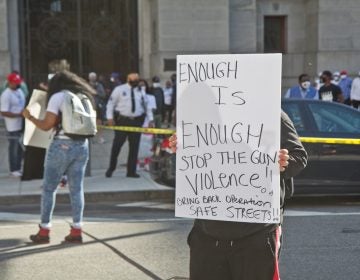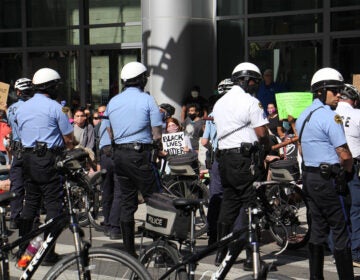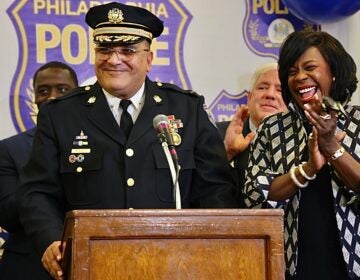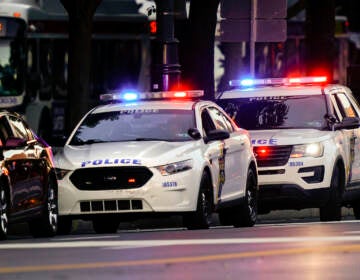Philly police plan to ask for more funds as Taser rollout falls short
The PPD plans to ask City Hall for more money for Tasers. The department began buying the stun devices after an officer fatally shot Walter Wallace Jr.
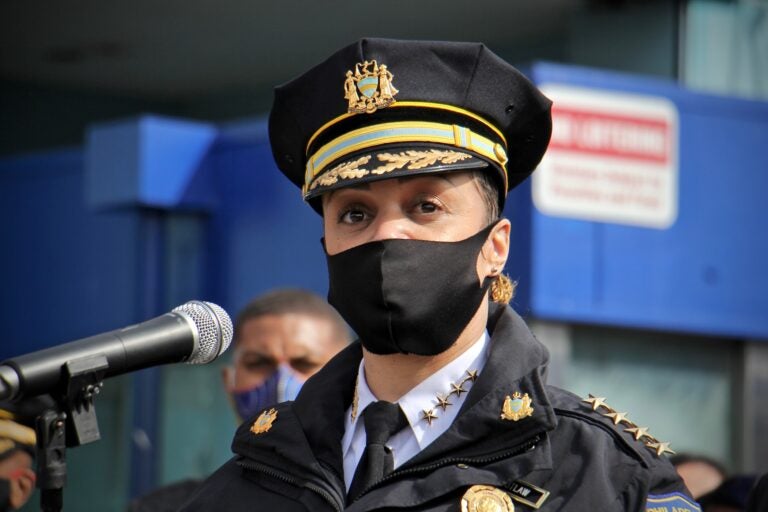
Philadelphia Police Commissioner Danielle Outlaw speaks at Olney Transportation Center. (Emma Lee/WHYY)
Mayor Jim Kenney revealed a budget plan this week that would freeze the Philadelphia Police Department’s $727 million budget for a second year in a row –– but top brass say they already need more funding.
Philly Police spokesperson Sgt. Eric Gripp said the department would convey a request to Kenney’s office seeking more money to maintain a five-year plan to equip patrol officers with Taser stun devices. The $14 million effort was crafted last November after the high-profile killing of Walter Wallace Jr. by police last year, following a mental health crisis.
Gripp did not link the request to Kenney’s proposed budget, saying instead that the plan to equip some 4,500 patrol officers with the less-lethal devices had hit some snags.
“Currently, 2,672 officers have been issued Tasers,” he said, an increase of about 350 devices from late last year. “However, the Tasers are nearing end of life or becoming obsolete and must be replaced.”
Gripp said the devices had an operational shelf life of about five to seven years. Taser-equipped officers being reassigned from street duty and delays linked to COVID-19 had also slowed progress on training. About 3,100 officers have been trained to date.
The mayor’s proposed city budget, first unveiled on Wednesday, would keep police funding levels at $727 million while injecting additional funding for anti-violence programs, police reform and crime-solving technology. While Gripp said the department had sufficient funding in place to continue the Taser rollout through the end of this fiscal year, in June, but would need additional funding atop the $727 million to keep the rollout on schedule.
Gripp did not specify exactly how much the department would seek, but advocates for diverting police funding into community programs have already expressed dismay over Kenney’s proposed law enforcement budget.
Kris Henderson, director of the Amistad Law Project, flatly rejected any increases to the PPD’s budget on Thursday, calling instead for more funding for social programs and civilian mental health intervention.
“Our communities need care, not the threat of more violence,” they said.
The situation is a far cry from last summer, when the Kenney administration sought a funding increase for law enforcement while attempting to axe funding anti-violence programs and police oversight. Officials eventually voted to keep police spending at its current level and restore some funds that were eliminated for social programs in the final $4.9 billion budget. This year’s budget totals $5.18 billion.
This figure could rise with spiraling overtime costs, which ran a record-high tab last year amid waves of protests against police violence. It also doesn’t reflect funding increases to other elements of the justice system, like city prisons.
Gripp also indicated that funds to provide more crisis intervention training to police after the Wallace incident — which was initially included in the $14 million ask — had since been “decoupled” from the PPD’s budget.
Under Kenney’s proposed budget, the program would be folded into $13 million for the “911 co-responder and mobile crisis units” that would be split, with $5.2 million going to the Managing Director’s Office to oversee the co-responder model, and another $8 million to the Department of Behavioral Health and Intellectual disAbility Services.
Henderson described the reshuffling as “a shell game” designed to create the appearance of flat police funding.
“Philadelphia Mayor Jim Kenney is trying to pull the wool over our eyes,” they said. “Resources that still end up in the hands of police are police funding.”
Despite last year’s $14M budget ‘cut,’ some duties still being handled by police
Facing pressure from “Defund the Police” activists last year, the Kenney administration also transferred $14 million from the PPD to the managing director’s purview — most of it to fund crossing guards. Some advocates characterized it as a bait and switch, a token move enacted to quell blowback as protests against police violence roiled the city.
A year later, however, the PPD is still handling some of the crossing guard operations, despite the budget line change.
“[The MDO] manages recruitment and fiscal administration, and are working to transition the rest of the operations,” said city spokesperson Mike Dunn. Police are “providing temporary support, including training and deployment assignments” as they finalize the transition to MDO control, Dunn said.
Managing Director Tumar Alexander said collaborative operations that span multiple departments, like the crossing guards, are better administered by his office.
“When the work crosses multiple areas, it winds up in the MDO,” said city budget director Marisa Waxman.
Anti-violence programs and police oversight restored
Some progressive advocates were cheered by other elements of the mayor’s budget proposal.
Another $18.7 million would go to anti-violence programs, including $2.6 million in funding would go aimed at disrupting gun feuds in the streets, including Group Violence Intervention and the Community Crisis Intervention Program.
The new budget also earmarks a $950,000 increase for the city’s newly rebranded police oversight board. Additional dollars budgeted for the city’s Office of Information and Technology would help the city upgrade apparently defunct “early warning” software meant to flag potentially problematic police officers.
Anthony Erace, the director of the Citizens Police Oversight Commission, said it’s still too early to celebrate or criticize the proposed funding to oversight. City Council still hasn’t voted on legislation that will codify the oversight commission’s new jurisdiction and powers.
“It’s too early to celebrate or get mad,” Erace said. “We don’t know what the mandate is going to require.”
Editor’s note: This article was updated to correct a statement regarding funds for a police co-responder program.

Subscribe to PlanPhilly
WHYY is your source for fact-based, in-depth journalism and information. As a nonprofit organization, we rely on financial support from readers like you. Please give today.



